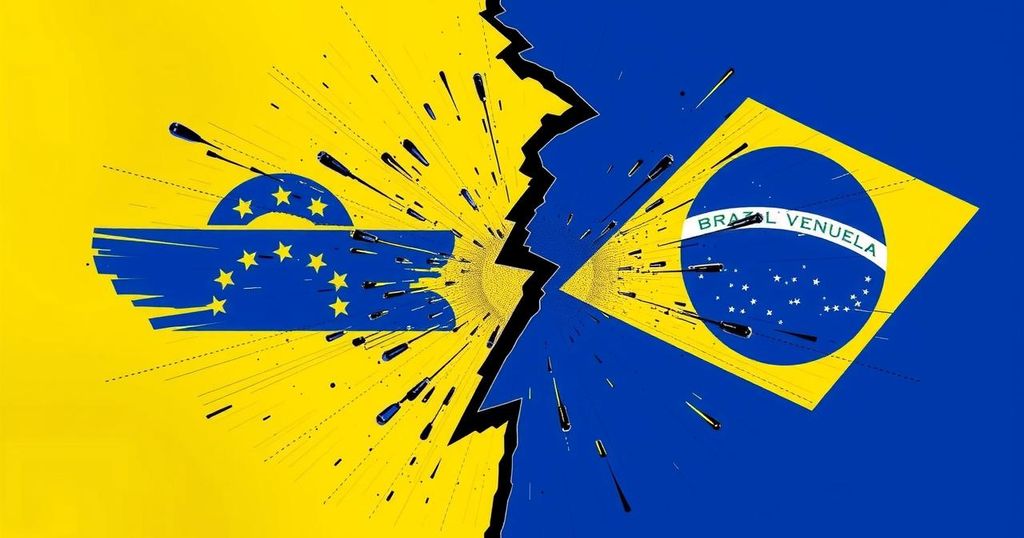Venezuela Intensifies Rhetoric Against Brazil Following BRICS Exclusion
Venezuela’s relations with Brazil are deteriorating as President Nicolás Maduro, whose bid for BRICS membership was thwarted by Brazil, retaliates with harsh rhetoric. Venezuela has recalled its ambassador from Brazil and has accused Brazilian officials of serving U.S. interests. The controversy stems from Maduro’s contested election results and concerns over Venezuela’s international standing.
Relations between Venezuela and Brazil are rapidly deteriorating following Venezuelan President Nicolas Maduro’s unsuccessful attempt to secure membership in the BRICS bloc of emerging market nations due to Brazilian opposition. A prominent ally of Maduro fiercely criticized Celso Amorim, a senior adviser to Brazilian President Luiz Inacio Lula da Silva, accusing him of acting in favor of U.S. interests and warning of potential repercussions from the Venezuelan legislature. Subsequently, Venezuela’s foreign ministry announced the recall of its ambassador from Brazil and summoned Brazil’s chargé d’affaires in Caracas for a reprimand, as Lula’s ambassador was unavailable due to vacation. President Lula himself has not commented on the situation, having been absent from a recent summit in Kazan, Russia due to a head injury. During a congressional session, Amorim explained that Venezuela’s exclusion from BRICS stemmed from concerns regarding its international reputation following the controversial presidential elections held in July. National Assembly President Jorge Rodriguez expressed disdain towards Amorim’s involvement, stating, “You behaved in a malicious manner, more like an interlocutor of the US government than in the role supposedly assigned by President Lula.” He asserted that Brazil’s position regarding the inclusion of new BRICS members is that they must possess regional stature and international credibility, attributes Venezuela purportedly lacks. Despite declaring himself the victor of the July 28 elections, Maduro has not provided concrete voting records to corroborate his claim. He had hoped for BRICS membership to align with Latin American allies such as Cuba and Bolivia but accused Brazil of obstructing this goal despite having the tacit support of other BRICS members. In the aftermath of the decision, Maduro intensified his criticisms of Brazilian officials, labeling Venezuela’s exclusion as a “stab in the back.” He proclaimed, “No one shuts Venezuela up or vetoes it,” indicating his intent to await President Lula’s informed response. Amorim characterized Venezuela’s reaction to the decision as “totally disproportionate” but did not comment further on the unfolding events. Previous attempts to mediate the tensions between Lula and Maduro post-election by Lula and Colombian President Gustavo Petro were unsuccessful, with Lula adopting a more critical stance toward Maduro’s administration since those elections. Meanwhile, the opposition has contested the validity of Maduro’s electoral success, asserting that their candidate received overwhelming popular support and highlighting the precarious situation for opposition leaders in Venezuela.
The BRICS alliance, comprised of Brazil, Russia, India, China, and South Africa, was viewed as an opportunity for Venezuela to strengthen its international ties and assert its influence among emerging markets. However, Venezuela’s contentious political landscape, including allegations of electoral fraud and severe repression of dissent, has rendered it a polarizing candidate within regional politics. Brazilian foreign policy has been influenced by these factors and aims to maintain regional stability, which has led to their refusal to support Venezuela’s entry into BRICS. The strained relations are a culmination of the complexities surrounding diplomatic recognition, regional influence, and socio-political dynamics in Latin America.
In summary, the diplomatic tensions between Venezuela and Brazil have escalated following Venezuela’s exclusion from the BRICS bloc due to concerns over its legitimacy and regional standing post-election. Maduro’s administration has responded with pointed criticism towards Brazilian officials, indicating a significant rupture in relations. The unfolding situation underscores the intricate balance of power and influence among emerging market nations and highlights the ramifications of domestic political struggles on international diplomacy.
Original Source: www.livemint.com




Post Comment